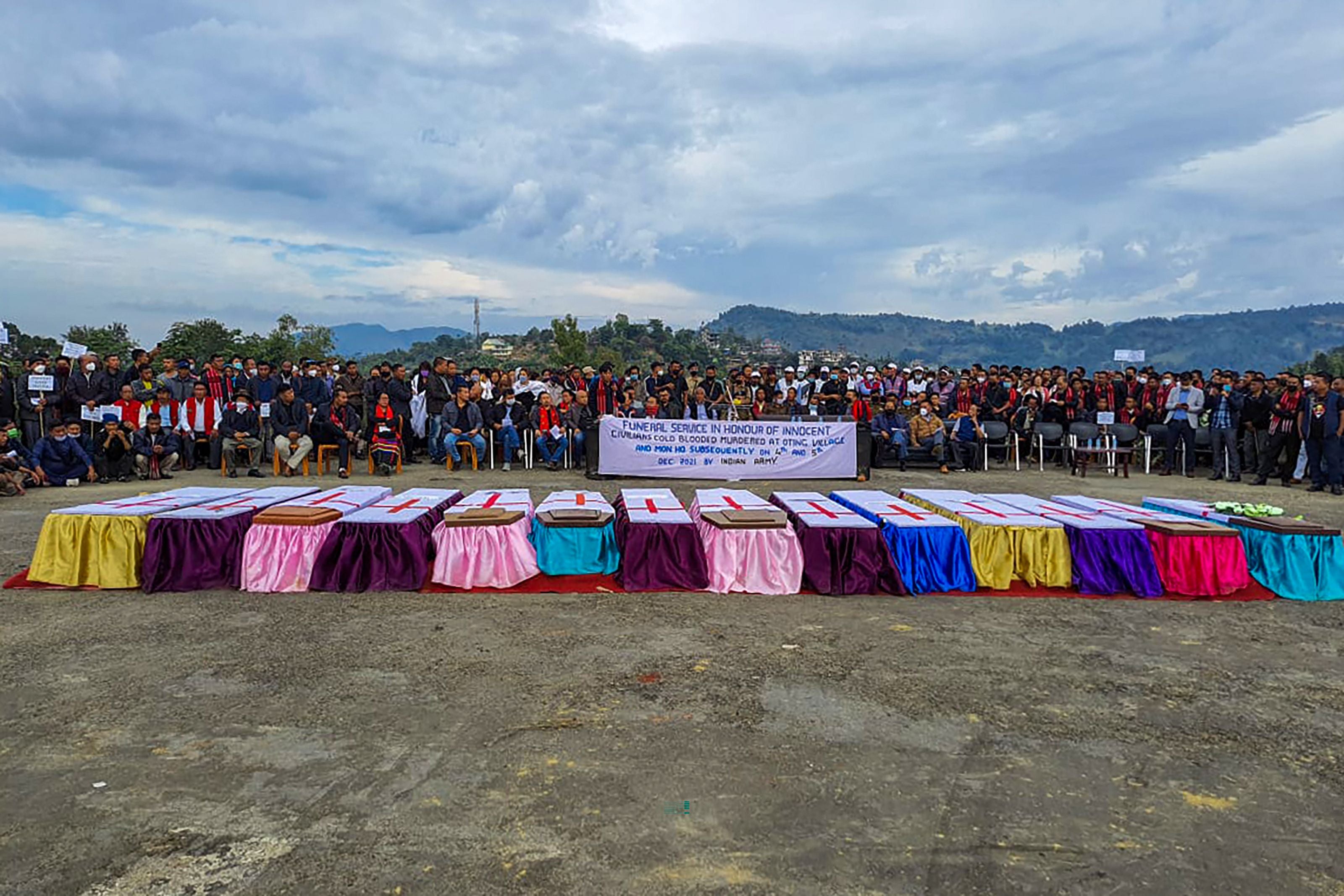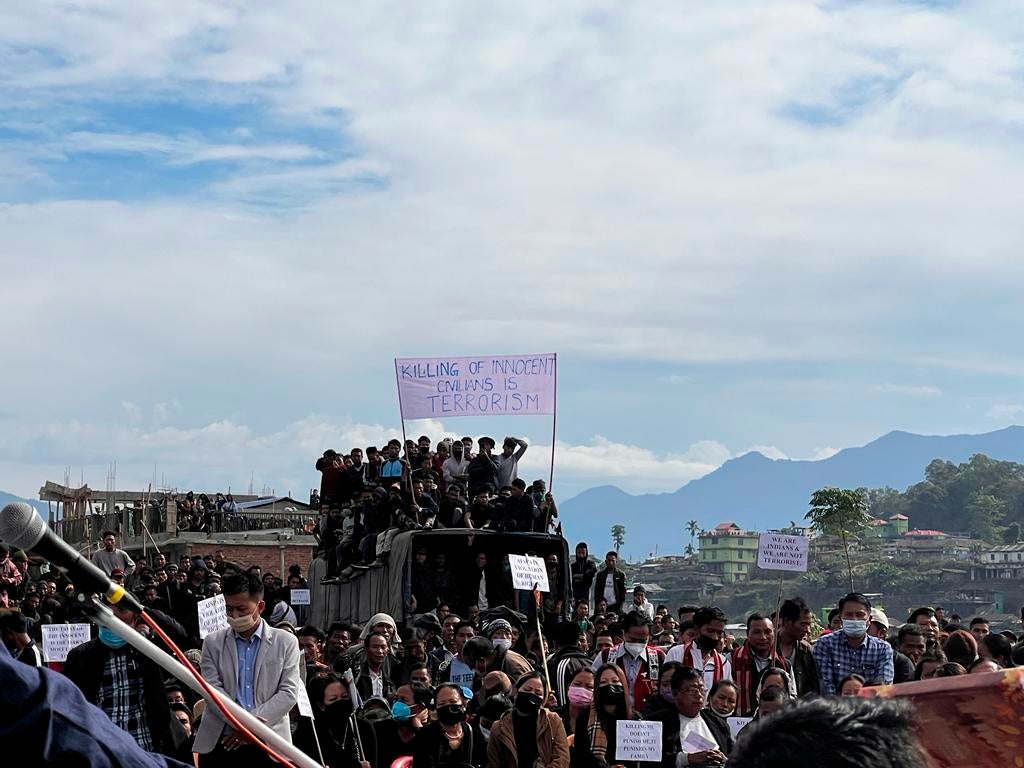Mass funeral held for 15 civilians mistakenly killed by Indian armed forces
The chief ministers of two Indian states, both allies of the ruling BJP, have revived calls to revoke special powers given to India’s military

A mass funeral for 15 civilians killed by India’s security forces in the northeastern state of Nagaland was conducted on Monday amid tight security.
Hundreds of mourners attended the service led by the state’s chief minister Neiphiu Rio. The state government had earlier announced compensation of Rs 500,000 (£4,992) each to the families of the deceased.
The killing of the civilians has revived harsh criticism of the actions of the Indian security forces and of the Armed Forces Special Powers Act (AFSPA), a law that grants such forces sweeping powers ranging from arresting people without producing warrants and the right to shoot to kill.
Security officials on Saturday evening shot dead 13 people from the region’s predominant Konyak tribe after “mistaking” them for insurgents in the Mon district that borders Myanmar.
At least six coal mine workers were among those killed in the initial incident, and another seven were killed after locals retaliated by attacking the military.

A member of the security personnel was also killed in the aftermath of the counter-insurgency operation.
A livid mob of hundreds vandalised the camp of the Assam Rifles, an elite para-commando battalion of the Indian army that led the counter-insurgency operation, on Sunday amid protests against the military that became violent, resulting in the death of another member of the tribe.
After videos of the vandalism went viral on social media, internet services in the district were cut off. Authorities also prohibited public gatherings of more than five people at a time, under section 144 of the federal Criminal Procedure Code.
A complete shutdown has been imposed in state capital Kohima after locals took to the streets in protest against the army.
In a statement, the Indian army said the aftermath of the incident was “deeply regretted”.
“Based on credible intelligence of likely movement of insurgents, a specific operation was planned to be conducted in the area of Tiru, Mon District, Nagaland. The incident and its aftermath are deeply regretted,” the statement read.
The state police, in an initial chargesheet or “first information report” (FIR) against the military, said their “intention” was to “murder and injure civilians”. The FIR also listed apparent lapses in the military operation.
The FIR stated that during the incident “there was no police guide nor security forces” and that there was no “requisition to the police station to provide police guide for their operation”.
“Hence, it is obvious that the intention of the security forces is to murder and injure civilians.”
After attending the funeral services, the chief minister Mr Rio called the AFSPA law a “black spot” and demanded its withdrawal.
“I have also urged the union government to remove AFSPA from Nagaland as the law is a black spot on the image of the country,” he told reporters.
“Nagaland and the Naga people have always opposed AFSPA. It should be repealed,” he said in a tweet.
Earlier in the day, Conrad Sangma, the chief minister of the neighbouring Meghalaya state, placed similar demands.
Both the chief ministers are allies of India’s ruling right-wing Bharatiya Janata Party, led by the prime minister Narendra Modi.
Mr Modi’s government had extended the imposition of AFSPA in the entire of Nagaland for six months in June. The government claimed the whole state was in a “disturbed and dangerous condition” due to the presence of multiple insurgent groups.
Apart from Nagaland, the law is imposed in Assam, Manipur and parts of Arunachal Pradesh. A similar act has been imposed in India-administered Jammu and Kashmir, considered to be the world’s most militarised region.
Meanwhile, India’s federal home minister Amit Shah told the lower house of the country’s parliament that a special investigation team was formed to complete an investigation into the Nagaland incident within a month.
“Situation is tense but under control. All agencies have to ensure such incidents do not happen in future,” he said, as opposition parties staged a walkout.
Rahul Gandhi, a leader of one of the primary opposition parties, the Indian National Congress, had attacked the ministry.
“What exactly is the home ministry doing when neither civilians nor security personnel are safe in our own land?” he asked in a tweet.
Join our commenting forum
Join thought-provoking conversations, follow other Independent readers and see their replies
Comments
Bookmark popover
Removed from bookmarks